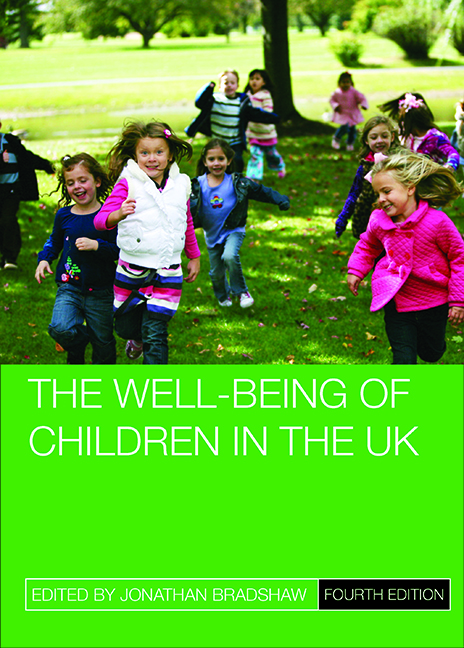Book contents
- Frontmatter
- Contents
- List of figures and tables
- List of abbreviations
- Notes on contributors
- Acknowledgements
- One Introduction
- Two Demography of childhood
- Three Child poverty and deprivation
- Four Physical health
- Five Subjective well-being and mental health
- Six Education
- Seven Housing and the environment for children
- Eight Children’s time and space
- Nine Children and young people in care and leaving care
- Ten Child maltreatment
- Eleven Childcare and early years
- Twelve Children, crime and correction
- Thirteen Conclusion
- Bibliography
- Index
Six - Education
Published online by Cambridge University Press: 01 September 2022
- Frontmatter
- Contents
- List of figures and tables
- List of abbreviations
- Notes on contributors
- Acknowledgements
- One Introduction
- Two Demography of childhood
- Three Child poverty and deprivation
- Four Physical health
- Five Subjective well-being and mental health
- Six Education
- Seven Housing and the environment for children
- Eight Children’s time and space
- Nine Children and young people in care and leaving care
- Ten Child maltreatment
- Eleven Childcare and early years
- Twelve Children, crime and correction
- Thirteen Conclusion
- Bibliography
- Index
Summary
Key statistics
• Eighty-nine per cent of Key Stage 2 pupils achieved the attainment targets in Reading and 86% in Maths in 2014/15.
• Seventy-eight per cent of Key Stage 4 pupils achieved the attainment target of five good GCSEs in 2014/15.
• Over 70% of the pupils from London achieved five good GCSEs or equivalent in 2013/14 compared to only around 63% of the pupils in Yorkshire and the Humber, East Midlands and North East.
• The proportions of young people aged 19 achieving Level 2 and 3 in 2014 were 87% and 60% respectively.
• Almost 86% of all 16- to 18-year-olds in England were in education and training in 2013, which was a record high since records began, while 7.6% of them were NEET (not in education, training or employment) in the same period.
• There are some variations in the proportion of pupils with a special educational need (SEN) statement across the UK countries, ranging from less than 3% in England and Wales to 5-6% in Northern Ireland and Scotland in 2014.
Key trends
• Pupils’ attainment in England has improved across all Key Stages under review, although there may be some early evidence of a decline in Key Stage 4 attainment in 2014/15.
• The reduction in attainment gap between free school meals (FSM) and non-FSM pupils remains stubbornly slow in some UK regions, but the attainment gap in London has narrowed substantially over recent years.
• UK pupils performed as well as their OECD counterparts in the Programme for International Student Assessment (PISA) 2012 assessment in Literacy and Maths and did comparatively better than the OECD average in Science. This pattern was largely similar to that observed in PISA 2006 and 2009.
• In the most recent Health Behaviour in School-aged Children (HBSC) survey (2010), fewer children said that they liked school a lot than in 2006.
• Between 2008/09 and 2013/14, overall absence rates have declined in both primary and secondary schools in all four UK countries, except for Scottish primary schools.
• The rates of fixed period and permanent exclusions declined across all schools in England between 2009/10 and 2013/14.
• A total of 2.8% of all pupils in England have a statement of SEN in 2015; this rate has remained the same for the past five years.
- Type
- Chapter
- Information
- The well-being of children in the UK (4th edition) , pp. 149 - 178Publisher: Bristol University PressPrint publication year: 2011



